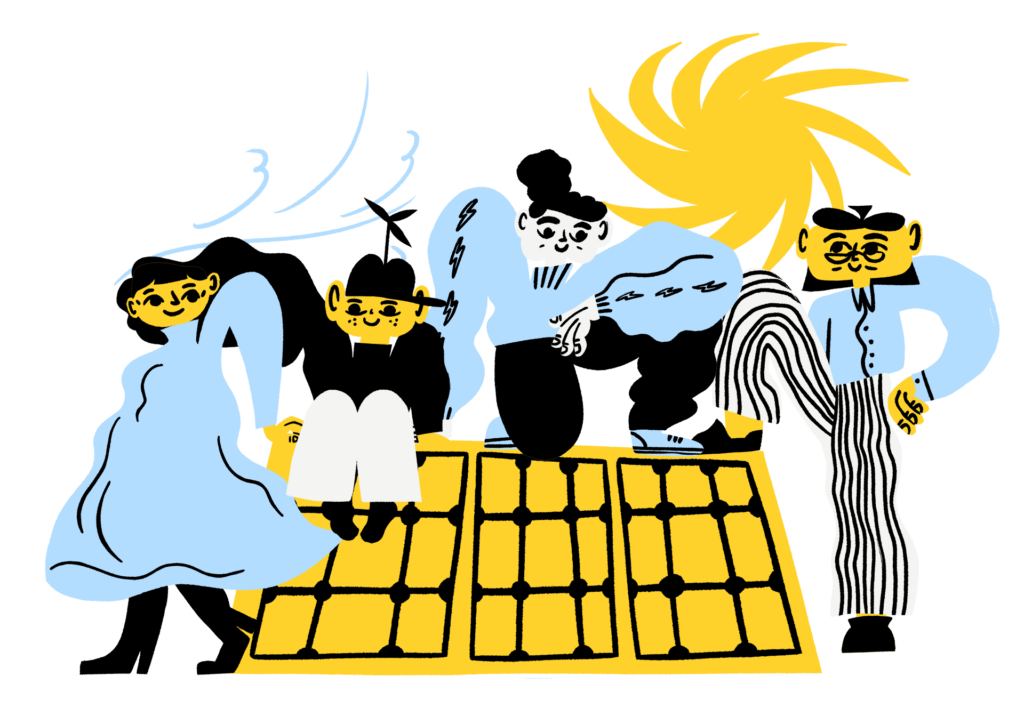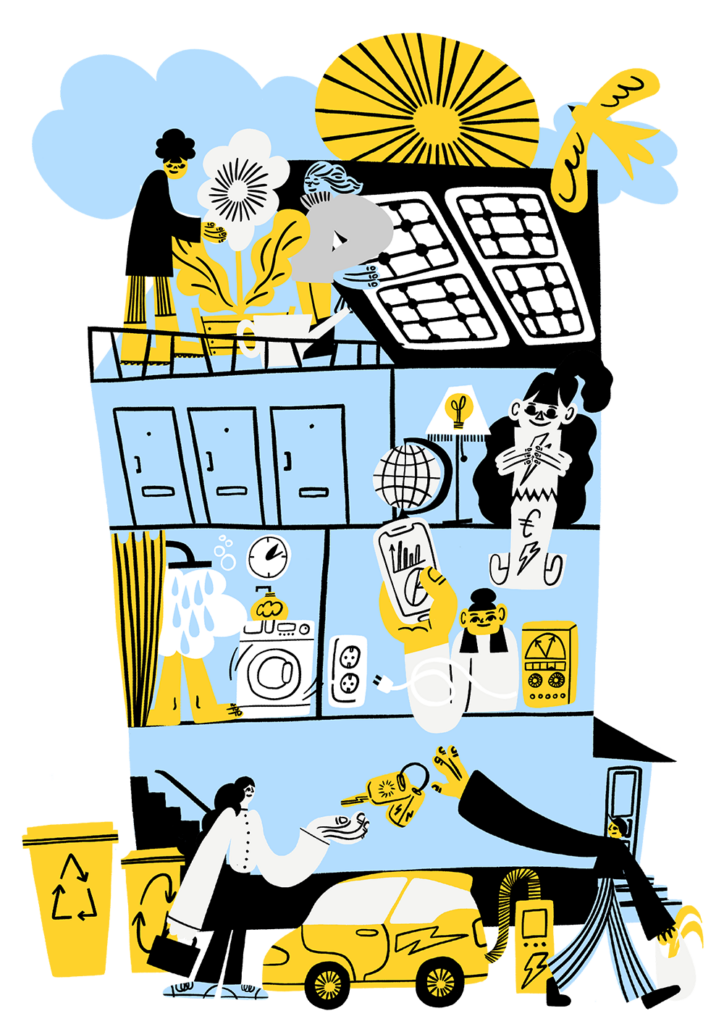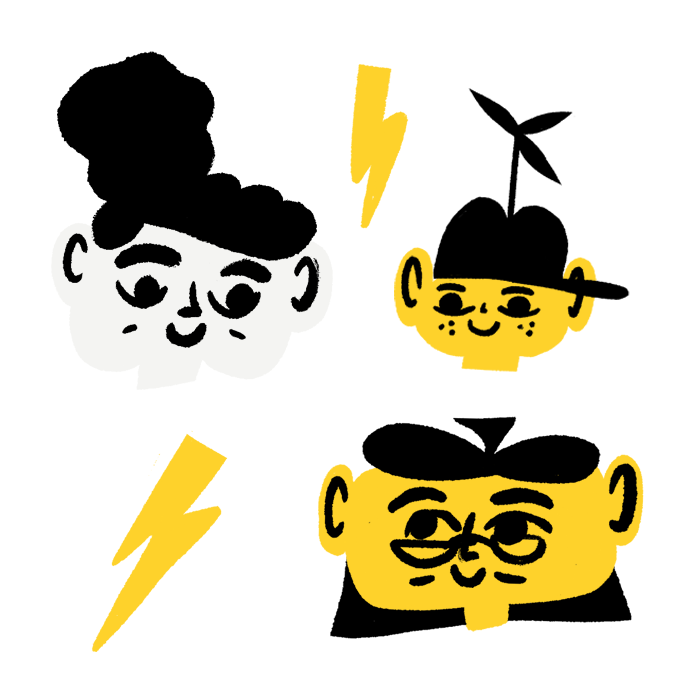ENERGY COMMUNITIES
Take the next step in your relationship with energy
It’s no longer news that adapting to the climate crisis requires major changes to the current energy system. We must break free from fossil energy and find new, environmentally friendly alternatives. The energy crisis has accelerated the need for change, and many of us are wondering how to cope with energy bills.
What can we do as a community? Energy communities can be one of the keys to a sustainable transition and taming future energy crises. There are already approximately 7,000 local energy communities in Europe. Since 2021, the GRETA project has investigated how energy citizenship, and specifically energy communities, can be supported.
What’s in it for you? In an energy community, together with your neighbours, friends or other citizens, you can create both cheaper and cleaner energy that is more equally accessible. Read further to find out what energy communities are and what you can do to establish one in your neighbourhood.

What is an energy community?
In a nutshell, an energy community is a group of people, for instance residents in a neighbourhood, who cooperate in energy actions such as generating, storing, consuming or selling the community’s own energy. For example, they can buy an electric car for joint use or build solar panels on roofs. Energy communities can be localized or virtual.
Here’s an example!
Even though we talk about the power of communities, individual lifestyle choices matter, too. In fact, there’s still a lot you can do, even if you are not part of an energy community.
Energy citizenship means that us citizens can actively participate in energy systems and have a positive impact on the energy transition. This can take many forms, from using energy-saving appliances, opting for renewable energy solutions, using electric vehicles to participating for instance in climate change demonstrations. Energy communities are one form of active energy citizenship.
In GRETA, we conducted a multinational survey with 10,000 participants in the EU and identified eight different types of energy citizens in the EU. To get you equipped with concrete and easy actions in your everyday life, take a quiz and get personal tips on how to use energy more sustainably!

This energy cooperative formed by the neighbourhood is just one example of what energy communities can mean in practice – they come in many forms, models and sizes. Here are some more examples from project GRETA:
A virtual community shares tips and encourages a more ecological lifestyle
A residential heating network uses renewable energy
A collective maintains its own solar panel field
A network of cities supports the introduction of natural gas-free living
A renewable energy community emerges in a socioeconomically challenged district
What are the benefits of energy communities?
Now we know what energy communities can look like. But what about their benefits, and why should they be promoted? There are several benefits; here are four examples.
ENVIRONMENTALLY FRIENDLY LIFESTYLE AND LOWER ENERGY BILLS
We have good news for you: taking part in an energy community is good for the planet and for your wallet. In an energy community you can create cleaner energy and also use it more sustainably, which shows on your energy bills. Participating in the needed energy transition also benefits you personally.
MORE EQUAL OPPORTUNITIES TO INFLUENCE ENERGY MATTERS
Producing your own energy usually requires investments. For example, building solar panels is expensive, and only a few individuals or households can afford it. Energy communities increase your opportunities to influence matters, as you can make purchases and save energy together with your community.
GREATER IMPACT WITH COLLECTIVE POWER
The choices of even one person or household are important, but when many of us take action together, the impact is much greater. Saving electricity in our households is very welcomed, but in the case of large systemic problems, individual everyday actions are usually not enough to cause (long-term) change. As a member of an energy community, the opportunities to make an impact increase. Often doing things together is also more fun!
INCREASED UNDERSTANDING OF ENERGY ISSUES
The energy crisis forced us to find out more about energy production, and we have taken a big leap forward in our understanding of, for example, electricity production, consumption and price determination. Energy communities create a forum for knowledge-sharing and help form new habits that promote a more sustainable lifestyle.

What can individuals do?
Even though we talk about the power of communities, individual lifestyle choices matter, too. In fact, there’s still a lot you can do, even if you are not part of an energy community.
Energy citizenship means that us citizens can actively participate in energy systems and have a positive impact on the energy transition. This can take many forms, from using energy-saving appliances, opting for renewable energy solutions, using electric vehicles to participating for instance in climate change demonstrations. Energy communities are one form of active energy citizenship.
In GRETA, we conducted a multinational survey with 10,000 participants in the EU and identified eight different types of energy citizens in the EU. To get you equipped with concrete and easy actions in your everyday life, take a quiz and get personal tips on how to use energy more sustainably!
Where can I find more information?
Now that you know some more about energy communities, it’s time to get started. We at GRETA want to pave the path to active energy citizenship and energy communities. Many countries have local guidelines to help you out, too. Below, you can find information, tools and recommendations to help you move forward in your energy citizenship and establish an energy community of your own.
NATIONAL GUIDELINES FOR ENERGY COMMUNITIES
COMMUNITY TRANSITION PATHWAYS
These roadmaps define actions that communities can take in order to achieve a transition towards greener energy within the energy system.
ENERGY CITIZENSHIP CONTRACTS
These innovative policy tools facilitate transparent communication between citizens, policymakers and stakeholders and help policymakers understand and address citizens’ needs.
ENERGY COMMUNITY PLATFORM
This platform was launched in 2022 by the European federation of citizen energy cooperatives. On the platform, you can find resources and tools to start and develop your energy community.

